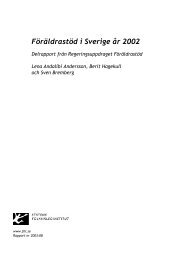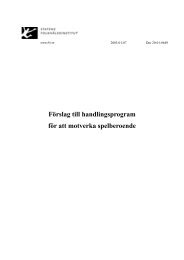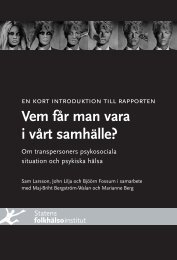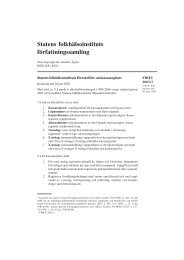Gambling motivation and involvement: A review of social
Gambling motivation and involvement: A review of social
Gambling motivation and involvement: A review of social
Create successful ePaper yourself
Turn your PDF publications into a flip-book with our unique Google optimized e-Paper software.
RELEvancE tO pRObLEm GambLinG StudiES<br />
The observation that, to some extent, people gamble to escape from everyday life,<br />
which may include frustrations <strong>of</strong> varying kinds, is uncontroversial. This can be<br />
expected as gambling is for the most part a leisure activity in which people engage<br />
voluntarily. It is generally accepted in psychology that some forms <strong>of</strong> problem gambling<br />
have to do with an intensely felt need for escape. Qualitative <strong>and</strong> other studies<br />
that tell about the particulars <strong>of</strong> escape <strong>and</strong> the corresponding emotional <strong>and</strong><br />
sensory rewards <strong>of</strong> gambling are <strong>of</strong> value for problem gambling studies. Motives for<br />
engaging in specific forms <strong>of</strong> gambling can be revealed <strong>and</strong> the strength <strong>of</strong> the forces<br />
that push the gambler away from ordinary life <strong>and</strong> pull him or her towards gambling<br />
ought to have an influence on the degree <strong>of</strong> <strong>involvement</strong> in gambling.<br />
The <strong>social</strong> rewards <strong>of</strong> gambling<br />
Numerous writers have discussed the <strong>social</strong> rewards that individuals receive from<br />
gambling. Many <strong>of</strong> these works could be characterized as symbolic interactionalism,<br />
which is a major vein <strong>of</strong> microsociology that stems from the thoughts <strong>of</strong><br />
the American philosopher George Herbert Mead, on the <strong>social</strong> origin <strong>of</strong> mind <strong>and</strong><br />
self, as interpreted by the sociologist Herbert Blumer [81]. Being a reaction against<br />
behaviorism, symbolic interactionalism stresses that human actions are based on<br />
the interpretation <strong>of</strong> events, not simply responses to stimuli. Interpretation give<br />
meaning to events <strong>and</strong> the meanings are constantly modified in <strong>social</strong> interaction.<br />
Symbolic interactionalism is thus a study <strong>of</strong> culture <strong>and</strong> <strong>social</strong> meaning at the micro<br />
level. As such, it blends into studies <strong>of</strong> cultural meanings <strong>and</strong> patterns at larger<br />
scales, i.e. ethnology, anthropology, <strong>and</strong> cultural studies.<br />
Perhaps the most widely known theory on the <strong>social</strong> rewards <strong>of</strong> gambling was<br />
formulated by the American sociologist Erving G<strong>of</strong>fman, who worked for a time<br />
as a croupier <strong>and</strong> dealer in Nevada casinos. Although G<strong>of</strong>fman himself did not<br />
describe his thinking as symbolic interactionalism, it is usually labeled as that.<br />
G<strong>of</strong>fman focuses on small-scale <strong>social</strong> interaction between gamblers <strong>and</strong> the <strong>social</strong><br />
rewards that individuals gain from gambling.<br />
G<strong>of</strong>fman conceptualized <strong>social</strong> life in general as a game [82–84]. His views on<br />
gambling are most explicit in the essay Where the Action Is [85], in which he defines<br />
action as activities that are “consequential, problematic <strong>and</strong> undertaken for what<br />
is felt to be their own sake” (p. 136). Examples <strong>of</strong> such activities are competitive<br />
sports, participating in political debates, <strong>and</strong> nightclubbing, gambling being the<br />
“prototype <strong>of</strong> action” (p. 138). Action is always public <strong>and</strong> “fateful” – it is not<br />
known beforeh<strong>and</strong> how things will turn out. Action thus puts an individual under<br />
pressure <strong>and</strong> reveals his or her character. A strong character has a number <strong>of</strong> posi-<br />
16 G A M B L I N G M O T I VAT I O N A N D I N V O LV E M E N T

















